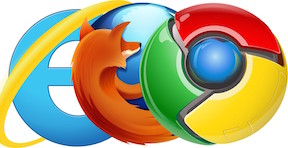 Your choice in browsers can be one of the most important decisions you’ll make on all your Internet-connected devices. It’s common for users to simply use whatever comes pre-loaded on the computer, but there can be significant differences in security, features, and performance if you switch to one of the many alternative options available.
Your choice in browsers can be one of the most important decisions you’ll make on all your Internet-connected devices. It’s common for users to simply use whatever comes pre-loaded on the computer, but there can be significant differences in security, features, and performance if you switch to one of the many alternative options available.
The only browser that I will always recommend against using is Microsoft’s Internet Explorer, as it’s loaded with old technology that is much easier to exploit.
Security
Since your browser is your window to everything on the Internet, it’s also highly targeted by hackers who will use a variety of methods to exploit you. Security is also a moving target, as new exploits are found and patched on a regular basis – which is why keeping any browser you use updated is critical.
At this year’s annual Pwn2Own computer hacking contest, Safari, Firefox, and Edge were all exploited in the first two days of the competition, while an engineer at Google discovered a major exploit in Chrome weeks before the contest started. This prompted all of the companies to create patches for the newly discovered holes, which generally get applied automatically.
The point I’m trying to make is that all browsers are vulnerable to attack and no matter which one is considered the most secure today, it’ll likely be considered less secure tomorrow as new exploits are discovered.
Opera recently announced the addition of a free VPN option in its browsers (http://bit.ly/2FYWxN4), so if you use public Wi-Fi a lot or want to keep your ISP from tracking your surfing, it’s an easy way to use a VPN.
Performance
This area of consideration gets a bit complicated because variables such as operating system, how many tabs you tend to open, and the resources available on your computer can play a big role. For instance, if you have an older computer or a slower Internet connection, Opera has features specifically designed to improve the performance for those situations.
If you have a new computer with lots of RAM, a fast hard drive, and great Internet speeds, the performance issues are mainly impacted by how many browser tabs you open at the same time. Each tab requires additional working memory (RAM) and some sites, like Facebook, tend to be huge memory hogs, so closing unnecessary tabs as you go along will help improve performance on any browser you use.
If you like to customize your browser with lots of add-ons, Chrome has by far the largest number of available options (http://bit.ly/2WJtzYg). If you like adding functionality, but want more privacy, Firefox (https://mzl.la/2FWSgdd) is a better option.
Your Best Option
There is no-one-size-fits-all solution, so you’ll need to experiment with each of them to see which one provides the best overall experience. It’s also a good idea to always have at least two different browsers on all your devices so you can quickly troubleshoot issues of getting to a website. By simply switching browsers, you can determine if it’s a connection issue or a browser issue.






